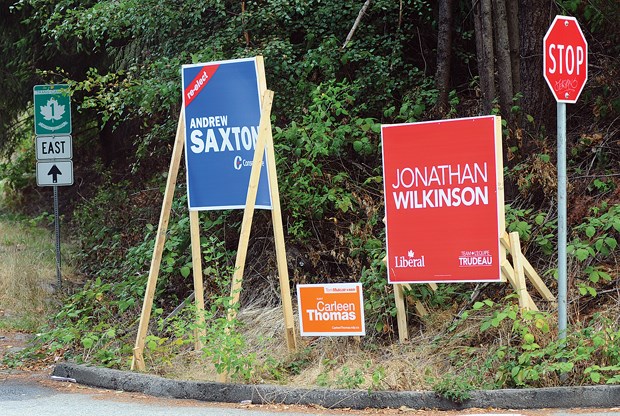Though Syria’s civil war has been raging for years and displaced millions of people, the refugee crisis wasn’t a political talking point for Canadian politicians until the now-iconic image of a drowned boy began to flash across our screens.
Since that time, the Liberals, Conservatives, Greens and NDP are all pledging to do more for Syria’s refugees.
Visiting West Vancouver on Thursday, Liberal leader Justin Trudeau said a Liberal government would bring over 25,000 Syrian refugees in the next few months, which Trudeau estimated would cost about $100 million. The plan would involve hiring more case workers to staff offices set up in Europe.
“As Canadians our hearts have gone out to the millions and millions of people who are struggling,” he said. “There’s a lot we should do and we should do now.”
Trudeau characterized the Conservative government’s response to the humanitarian crisis as “looking for excuses and dragging its heels.”
West Vancouver-Sunshine Coast-Sea to Sky Country Green Party challenger Ken Melamed said the current crisis has been exacerbated by the Harper government’s nearly 10 years in power.
“The current situation is condemnable,” he said. “Harper has cut the public service to the bone. They simply can’t process the applications. We need to have special provisions that allow us to adapt and be more nimble in these times of crisis.”
Melamed said Green members of parliament will also work to address the underlying issues causing the refugee crisis and that more bombs and jets are not the answer.
“Our overseas development aid has fallen to half of what the UN recommends, which is 0.7 per cent of GDP. We have to look at the root causes,” he said. “One of our fundamental principles is non-violent response. We think that economic measures are more successful in this case. If we look in the past, military intervention has never stopped militants and terrorists like ISIL. We need to take a different approach.”
The NDP’s plan is to accept 10,000 refugees by the end of this year and increase the number of government-sponsored refugees to 9,000 per year for the next four years, according to Larry Koopman, NDP candidate in West Vancouver-Sunshine Coast-Sea to Sky Country. That would involve appointing a refugee co-ordinator to speed up the process and fast-tracking private sponsorships.
“I know it’s an ambitious plan but we do believe that we can do it. It’s going to take a lot of co-ordination and effort,” he said. “Turkey alone has taken nearly two million Syrian refugees. Germany is expected to take 800,000. It is time for us to move quickly and do the right thing. I think we have a moral obligation to take immediate action.”
North Vancouver Conservative candidate Andrew Saxton said Canada is already punching above its weight when it comes to the refugees, and that the country is also contributing foreign aid and assisting in international military coalition against ISIS.
“We originally had a target of 11,300 Syrian refugees and the prime minister has now increased that to 21,300,” Saxton said. “Obama just announced that they’re going to resettle 10,000 refugees.
That’s a country 10 times our size and they’re resettling less than we are.”
Saxton said the refugee system is under a “huge amount of demand” right now, which has put strain on the system. More help is on the way, he added.
“The prime minister did say we are going to be taking some extra, concrete steps to expedite the process. We do anticipate there will be an announcement to that affect sometime soon,” he said. “We have to make sure that refugees have been cleared from a security standpoint and we don’t think it’s responsible to just send planes over and open the doors like Mr. Mulcair has said, and let anybody jump into the plane.”
Janet Dench, executive director of the Canadian Council for Refugees, said the process for coming to Canada as a refugee has been subject to more barriers and technicalities in recent years, slowing the process for all.
“In the last few years, the focus has been much more on closing the door and restricting who can get in and so there have been very few Syrians who can get in,” Dench said. “Now you kind of need to spend a year studying it in university before you can figure out what’s going on with the private sponsorship program. It’s certainly not user friendly.”
Dench took exception to the notion that Canada is somehow a leader in resettling refugees.
“I’d say it’s extremely offensive for Canada to be trying to put itself out as being the most generous in the context where many countries, in particular countries around Syria, are hosting millions of refugees,” she said. “Only a tiny percentage of the world’s refugees come to Canada.”
The council, along with a host of other non-government agencies, is recommending the government issue temporary residence permits to refugees who can stay with family in Canada, make private sponsorship easier and resettle 10,000 refugees by the end of the year.
— with files from Jane Seyd



